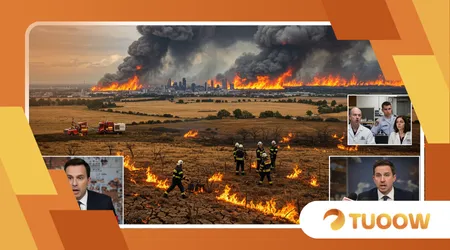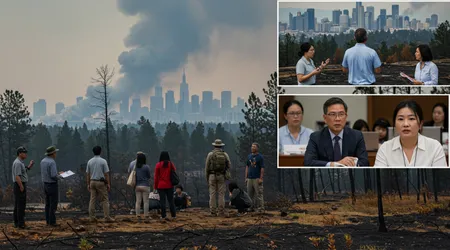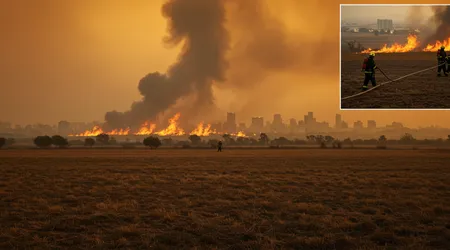Record Heatwaves and Wildfires Spark Urgent Debate on Climate Policy and Preparedness

The debate on climate policy has never been more urgent. As 2025 unfolds, the UK grapples with unprecedented heatwaves and wildfires, shattering records and exposing vulnerabilities.
April’s temperatures soared to a potential 30°C, the earliest such spike in seven years, while wildfires have already scorched more land than any year in over a decade.
These events aren’t isolated; they’re a clarion call. From policymakers in Westminster to communities in rural Scotland, the nation is waking up to the stark reality of a warming world.
This article dives into the escalating climate crisis, dissecting the debate on climate policy through the lens of preparedness, adaptation, and accountability.
Why are we still scrambling to respond when the science has been clear for decades?
The UK’s spring of 2025 has been a crucible of extremes. A “blocking” weather system parked over the nation diverted moist Atlantic air, leaving skies clear and temperatures soaring.
Wildfires tore through moorlands in Scotland, Wales, and England, with satellite data showing the burnt area surpassing annual records by April.
Meanwhile, homes are overheating 80% now face summer temperatures too high for comfort, quadrupling in a decade.
These aren’t just weather anomalies; they’re symptoms of a planet pushed to its limits.
The debate on climate policy must move beyond rhetoric to actionable strategies, or the cost human, economic, and environmental will be catastrophic.
This piece explores the UK’s climate challenges through three critical lenses: the science driving these extremes, the policy gaps fueling the debate on climate policy, and the practical steps needed for resilience.
We’ll unpack real-time data, draw on expert insights, and propose solutions grounded in 2025’s reality.
From retrofitting homes to rethinking energy grids, the path forward demands urgency and ingenuity. Will we rise to the challenge, or let inertia dictate our future?
The Science of a Scorching Reality
Heatwaves and wildfires aren’t random. A 2022 Met Office study found “fire weather” conditions in the UK were six times more likely due to human-driven climate change.
In 2025, this trend accelerates. April’s sunniest skies since 1910, coupled with record-low rainfall, created a tinderbox.
Scotland’s Highlands saw flames devour heather, while Yorkshire’s moors burned unchecked.
These events stem from a “blocking” high-pressure system, where sinking air warms and dries the land.
Climate models project worse to come. By 2050, urban nighttime temperatures could rise 0.05°C per decade, intensifying heat islands.
++ Russian Spy Ring Leader Sentenced: What the Verdict Means for UK Security
Wildfire-prone days may quadruple in a 2°C warmer world. The debate on climate policy hinges on this science ignoring it risks lives.
In 2022, heatwaves killed 3,000 in England; projections estimate 10,000 annual deaths by mid-century.
The human toll is visceral. During April’s heat, elderly residents in uninsulated flats struggled to breathe. Firefighters, stretched thin, battled blazes with limited resources.
The debate on climate policy must prioritize vulnerable populations, using data to drive equitable solutions.

Policy Gaps Fueling the Crisis
Westminster’s response to climate extremes has been patchy. The 2023 National Adaptation Programme was labeled “very weak” by experts for neglecting heatwave preparedness.
Flood risks threaten 6.3 million homes today, rising to 8 million by 2050. Yet, funding for resilience lags.
The debate on climate policy centers on this disconnect: ambitious net-zero targets exist, but adaptation is underfunded.
Political inertia compounds the issue. In 2025, the new Labour government faces pressure to balance economic growth with climate action.
Also read: UK Parliament Debates and Extends Pub Hours for 80th Anniversary of VE Day
Critics argue that scrapping coal plants without scaling renewables leaves energy grids vulnerable during heatwaves.
The debate on climate policy must address this energy paradox reliability can’t trump sustainability.
Local governance also falters. London’s 2024 heatwave exercise showed promise, but rural councils lack similar resources.
Example: Devon’s fire service, underfunded, struggled to contain April’s moorland fires. The debate on climate policy demands devolved funding to empower local action.
Practical Steps for a Resilient Future
Adaptation is no longer optional. Retrofitting homes with green roofs and air conditioning can curb overheating, which now affects 80% of UK households.
Schools and hospitals need similar upgrades 2022’s heatwave saw classrooms hit 35°C, disrupting learning. The debate on climate policy should champion these practical fixes.
Energy resilience is critical. Solar and wind must scale to meet heatwave-driven demand spikes.
Example: A Somerset community solar project powers 200 homes, cutting reliance on fossil fuels. Such initiatives need national backing to multiply.
Read more: World Travel Market London 2025
Public awareness is key. Campaigns teaching heatwave survival closing curtains, hydrating can save lives.
Fire services need real-time satellite data to predict wildfire spread. These steps, grounded in 2025’s challenges, must shape the debate on climate policy.
Accountability and Global Context
The UK doesn’t burn in isolation. India and Pakistan faced 50°C heat in April 2025, with crops wilting and millions displaced.
Europe’s 2024 wildfires in Portugal scorched 110,000 hectares in a week. The debate on climate policy must be global rich nations like the UK bear historical responsibility for emissions.
Accountability starts at home. The Climate Change Committee’s 2025 report warns of a 7% GDP hit by 2050 without action. Table 1 below outlines projected impacts:
| Climate Risk | 2025 Impact | 2050 Projection |
|---|---|---|
| Heatwave Deaths | 3,000/year | 10,000/year |
| Flooded Homes | 6.3 million | 8 million |
| Wildfire Days | 25% of summer | 50% of summer |
This data demands corporate and political accountability. Fossil fuel firms, still profiting, must fund transitions. The debate on climate policy hinges on enforcing this responsibility.
Grassroots movements are rising. In Manchester, activists blockaded a coal depot, demanding renewable investment.
Such actions remind us: policy isn’t just top-down. The debate on climate policy thrives when citizens hold power to account.
A Call to Rethink Preparedness

Imagine a house on fire, but instead of dousing the flames, we argue over who lit the match. That’s the UK’s climate response in 2025. Preparedness must evolve.
Fire services need drones to monitor wildfire spread, as trialed in Cumbria last month. Urban planning should mandate heat-resistant materials.
Education can transform behavior. A Bristol primary school teaches kids to spot wildfire risks, fostering a generation of climate stewards.
Scaling such programs nationally could shift cultural attitudes toward resilience.
Finally, funding must match ambition. The £720 million wind farm incentive boost in May 2025 is a start, but adaptation budgets need parity.
Without it, the debate on climate policy risks becoming a hollow echo.
Conclusion: Seizing the Moment
The UK stands at a crossroads in 2025. Record heatwaves and wildfires have ignited a fierce debate on climate policy, exposing gaps in preparedness and political will.
The science is undeniable human-driven warming fuels these crises. The solutions, from retrofitting homes to scaling renewables, are within reach.
Yet, they require courage, investment, and accountability. The statistic is stark: 80% of homes now overheat, a fourfold rise in a decade. This isn’t just a policy failure; it’s a human tragedy.
The debate on climate policy isn’t abstract it’s about lives, livelihoods, and the legacy we leave. Like a ship navigating a storm, we must adjust the sails now, not when the waves crash over.
Communities, from Devon to Delhi, demand action. Will we answer their call?
The time for half-measures is over. Let’s build a UK that doesn’t just survive climate extremes but thrives despite them.
Join the conversation share your ideas, hold leaders accountable, and act where you stand.
Frequently Asked Questions
Q: How is climate change making UK wildfires worse?
A: Climate change intensifies “fire weather” conditions hot, dry spells made six times more likely by human emissions, as per a 2022 Met Office study.
Q: What can individuals do during a heatwave?
A: Close curtains morning, stay hydrated, and avoid outdoor activity from 11 AM to 3 PM. Check on vulnerable neighbors, like the elderly.
